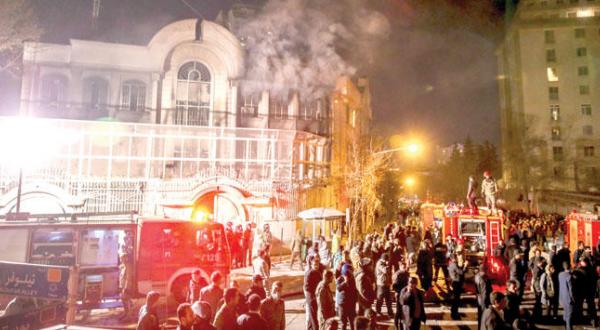PHOTO: Protesters in front of the burning Saudi Embassy in Tehran, January 2, 2015
LATEST
WEDNESDAY FEATURE
- Special: Regime In-Fighting and the “Spontaneous” Attack on the Saudi Embassy
UPDATE 1755 GMT: Qatar has recalled its ambassador to Iran, joining Gulf colleagues Saudi Arabia, Bahrain, Kuwait, and the UAE in downgrading relations with Tehran.
“The ministry summoned this morning Qatar’s ambassador to Tehran against the backdrop of attacks on the Embassy of the Kingdom of Saudi Arabia in Tehran,” Khalid Ibrahim Abdulrahman Al-Hamar, the director of the Asian Affairs Department, said.
Following the dispute over Saudi executions and Iranian protests that burned and ransacked the Saudi Embassy, Riyadh broke links with Iran on Sunday. Bahrain followed, while Kuwait and the UAE recalled their ambassadors and reduced diplomatic staff.
Sudan has also cut diplomatic ties with Tehran.
UPDATE 1600 GMT: Pictures from Urmia in northwest Iran indicate continued anti-Saudi protests, including armed demonstrators, despite the regime’s shift to criticism of last Saturday’s attack on the Saudi Embassy.
Under Article 27 of Iran’s Constitution, it is illegal to demonstrate with weapons, but a correspondent indicates that the rally may be supported by parts of the Iranian regime: “From the banners they are carrying it is obvious that most of them are Basij and Sepah [Revolutionary Guards] people.”
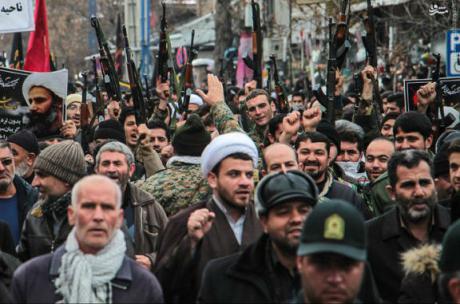
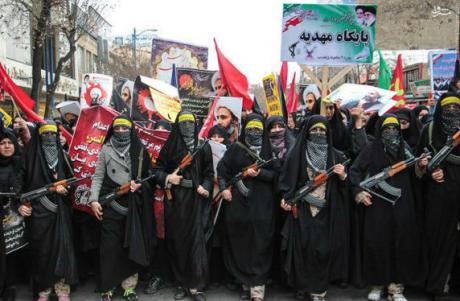
The crowd in front of a stage with photographs of the founder of the Islamic Republic, Ayatollah Khomeini; the Supreme Leader; Hezbollah leader Hassan Nasrallah; and the commander of Iran’s elite Qods Force, General Qassem Soleimani:
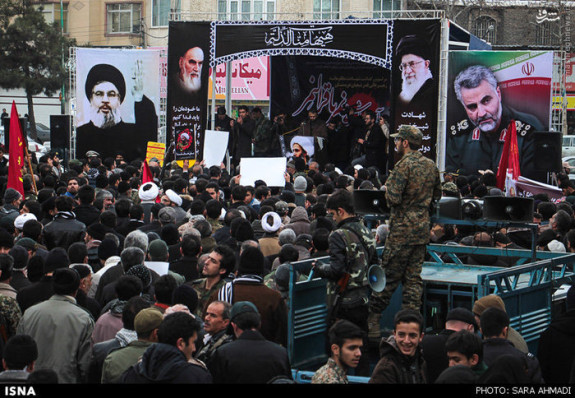
Rifles held in front of a poster of the executed Saudi cleric Sheikh Nimr Bakr al-Nimr:
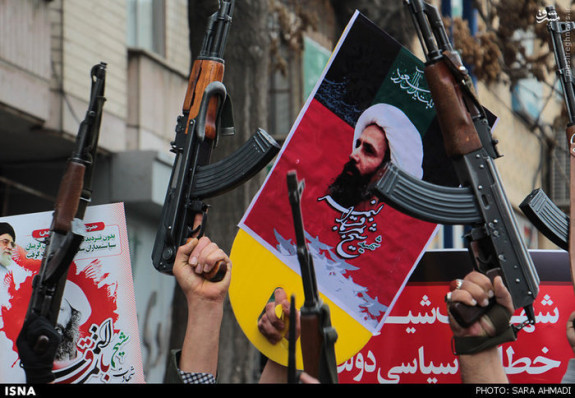
ORIGINAL ENTRY: Iran’s Revolutionary Guards have backed away from last Saturday night’s attack on the Saudi Embassy in Tehran, denying any responsibility for the “unjustified” event.
Hours after Saudi Arabia executed 47 detainees, including prominent Shia cleric Sheikh Nimr Baqr al-Baqr, protesters threw Molotov cocktails at the Embassy and then ransacked part of it before they were finally dispersed by police.
Riyadh broke off diplomatic relations with the Islamic Republic the following day, giving Iranian staff 48 hours to leave the country and withdrawing Saudi personnel from Tehran.
Iran’s President Rouhani said on Sunday that the attack was carried out by “extremists” who should be identified and prosecuted. However, Iranian State media continued to highlight protests until Monday, when the line began to shift to questioning of the attack.
A Revolutionary Guards Brigadier General, Mohsen Kazemeini, said, “The attack and burning of the Saudi Embassy…was very wrong, and by no means can this ugly act be justified.” He claimed that the protest was not carried out by “faithful forces”, instead blaming the “completely organized” demonstration on an unnamed person or group.
Meanwhile, Rouhani tried to keep the focus on Saudi actions rather than the Embassy affair. He claimed, after a meeting with Danish Foreign Minister Kristian Jensen, that in Tehran. Rouhani claimed that Saudi Arabia broke diplomatic ties to “cover up its great crime” of the executions, saying they were to suppress internal dissent:
The response to criticism must not be beheading. We hope that the European countries, which always react to human rights issues, also fulfill their human rights responsibilities on this issue.
#Saudi Arabia won't be able to cover up its crimes by cutting ties with Iran. Response to criticism should not be beheading. #HumanRights
— Hassan Rouhani (@HassanRouhani) January 5, 2016
“Rouhani May Be Biggest Casualty” of Attack on Saudi Embassy
Ladane Nasseri of Bloomberg posts an article assessing the effect inside Iran of last weekend’s attack on the Saudi Embassy in Tehran.
Analysts contributing to the article, including EA’s Scott Lucas, assess that the protest probably was planned by a hardline faction, not only to tap into anger over Saudi executions but also to challenge President Rouhani:
Rouhani “either has to go along with what happened and take a tough public line or he has to get back to a more moderate track”….“This is going to filter back into the battle for the Parliamentary and Assembly [of Experts] elections [in February].”
We have a longer analysis in today’s “Iran Special: Regime In-Fighting and the “Spontaneous” Attack on the Saudi Embassy“.

